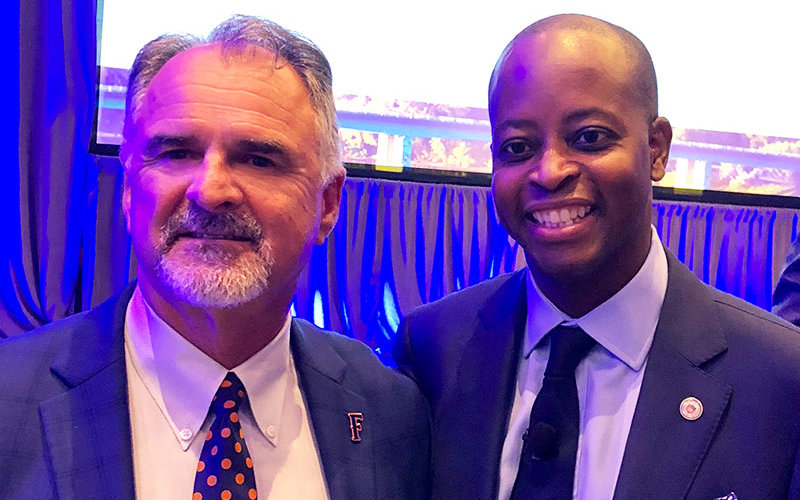
Cal State Fullerton President Fram Virjee was one of several university presidents taking part of a plenary session during the National Association of College and University Attorneys’ June conference in Minneapolis.
The June 24 plenary, “Leadership in Tumultuous Times: Navigating Through a Climate of Discord,” explored the role of university leadership in challenging times and the one played by counsel in exploring complex issues.
Virjee, who is also a member of NACUA’s board of directors, was asked about the result of recent surveys in which most presidents agree that college campuses are in a tumultuous state, yet don’t view their own campus as likely to experience a “high-profile incident,” such as a protest.
“At any one time across the nation we have hundreds, if not thousands of campuses where things are going just fine. Where it is business as usual, if you will. It’s easy to believe and feel that this won’t happen on your campus,” he said, “In contrast, we have a few campuses at any one time that may be flashpoints for these kinds of events. They are held out in the media as cause célèbres for these issues, and as a result, there is discussion about why it happened there — but a feeling of calm that ‘it’s not going to happen here.’
“It’s sort of like Congress. If you look at the national approval ratings for Congress, everybody thinks they’re doing a terrible job — but ‘my representative is doing a great job in my district.’”
Virjee characterized that sentiment as ‘Pollyanna-ish.’ “Each of us is one phone call, one tweet, one email away from something happening. What that tells me is that while we should feel comfortable in our space as much as possible, we have to plan ahead and be prepared,” he explained.
“What I’ve discovered in private practice, in advising universities, and also now as president, is that it’s all about relationship and preparation — creating foundational relationships with constituencies on campus in the good times, when you’re not worried about what’s happening on your campus … Knowing who in those constituency groups to talk to is key.
He also emphasized the importance of addressing free speech and First Amendment issues on campus, and “dispelling rumors or misconceptions about whether hate speech is illegal. You have to do that on campus ahead of time and in the community, as well — creating opportunities and relationships ahead of time so that when you need them, you can rely on them.”
When asked about how social media has changed communication and response to constituencies, Virjee admitted that social media has been “a game-changer.
“No longer is there the same cycle of time to decide how you’re going to respond — and this is one of the lessons we learn regularly, whether it’s faculty and staff going on social media, or reporting on what’s happening on our campuses in real time,” he explained.
“When something happens on campus, there’s an immediate reaction on social media, whether it’s positive or negative. It is assumed that I am paying close attention to my phone at all times, looking at every tweet and paying attention to every text and every email. An absence of response can be viewed as inattention, callousness or worse — agreeing with or approving of whatever has been said because you are not commenting on it.
“It means that you need to have a strategy ahead of time for rules of engagement in social media,” he added. “And that cannot be a secret strategy. It should be one that you share ahead of time so people are not expecting you to comment on every tweet or every controversial issue, and that you can actually point to when you don’t comment and say, this is not how we do this.”